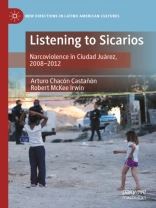Listening to Sicarios presents new insights into the lives of paid assassins of Mexico’s drug trafficking syndicates from the perspectives of the assassins themselves. Based on an extraordinary series of ethnographic interviews carried out in the wake of the record levels of narcoviolence experienced in Ciudad Juárez between 2008 and 2012, this study analyzes the ways in which these young men interpret their actions across four key thematic axes: border infrastructures, youth and responsibility, masculinity and sentiment, and ethics: good vs. evil.
It argues that sicarios follow a career path within a criminal corporate infrastructure that is especially robust in Mexican border cities. It also explores how sicarios understand youthful innocence in relation to adult accountability in the realm of violence that is frequently meted out by young men on other young men. It then analyzes sicarios’ expressions of feelings of power that may boost their sense of virility, aswell as feelings of fear and regret that imply weakness. Finally, it examines how sicarios defend their personal integrity in the face of a public discourse that views their acts as savage.Innehållsförteckning
1. Deadly Employment within the Border Industrial Complex.- 2. Youthful Murders: Innocence and Professionalism.- 3. Sicario Masculinities: Feeling Reckless and Respectful.- 4. Fury at the Limits of Good and Evil.
Om författaren
Arturo Chacón Castañón worked as a journalist, covering narcoviolence in Ciudad Júarez. He went on to earn a Ph D in Social Sciences from the Universidad Autónoma de Ciudad Juárez, where he is currently Professor of Journalism. He is author of various publications on youth and violence in Ciudad Juárez.
Robert Mc Kee Irwin is Deputy Director of the Global Migration Center at the University of California Davis, where he coordinates the digital storytelling project Humanizando la Deportación. He is author of numerous publications on gender, migration, borders and cinema in contexts of Mexican and Mexican American cultures.












